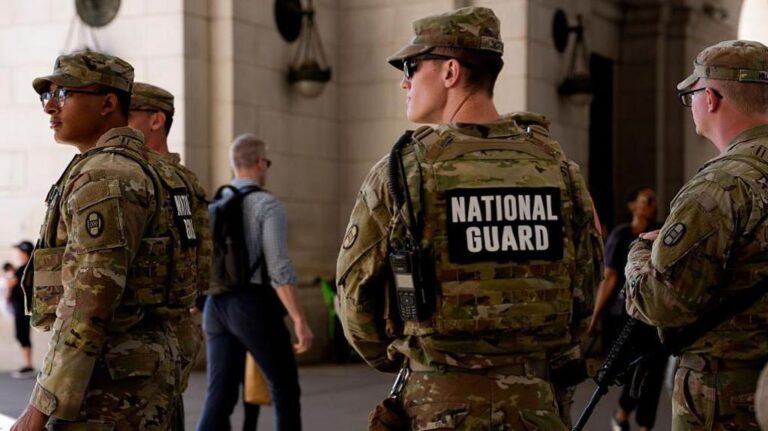Controversy Surrounding Former President Trump’s National Guard Deployment in California
Legal and Constitutional Challenges of Federal National Guard Deployment
Former President Donald Trump’s decision to send the National Guard into California without Governor Gavin Newsom’s approval has ignited significant legal debate. Constitutional scholars highlight that such unilateral federal action conflicts with established laws governing military involvement in domestic affairs, especially the Posse Comitatus Act. This legislation restricts the use of federal military forces for civilian law enforcement unless specific conditions are met, typically requiring state consent or a declared emergency.
By bypassing the governor’s authority, Trump’s move raises serious questions about state sovereignty and the delicate balance of power between federal and state governments enshrined in the Constitution. Key legal concerns include:
- Possible breach of the Insurrection Act: This act authorizes presidential deployment of troops domestically only under strict criteria,often involving state requests or recognized emergencies.
- Threat to federalism: Overriding state leadership risks setting a precedent where federal power could routinely eclipse state governance.
- Operational confusion: Conflicting directives between federal and state officials may hinder National Guard effectiveness during crises.
| Legal Concern | Explanation | Potential Outcome |
|---|---|---|
| State Sovereignty | Governor’s command over National Guard units | Litigation and operational standstill |
| Insurrection Act Application | Presidential deployment without state consent | Judicial injunctions against federal action |
| Constitutional Balance | Separation of powers infringements | Weakening of federalist principles |
Implications for Federal-State Dynamics and Public Confidence
The unilateral National Guard deployment has intensified strains between federal and state governments, challenging the cooperative spirit essential for effective governance.Experts warn that such federal overreach could erode the conventional respect for state autonomy, perhaps prompting states to fortify their own authority and fragment national cohesion.
Beyond institutional effects, this move risks diminishing public trust. When government leaders circumvent established protocols,citizens often grow skeptical about the legitimacy and intentions behind such actions. This skepticism can lead to reduced compliance with government directives and deepen political polarization, threatening the foundations of democratic dialogue and social stability.
- Federal Overreach: Risks undermining state authority and collaborative governance.
- Trust Erosion: Growing public doubt about government motives and openness.
- Heightened Polarization: Increasing societal divisions over legitimacy and power.
| Area Affected | Possible Result |
|---|---|
| Governance | Escalated conflicts between federal and state authorities |
| Public Perception | Declining confidence in political leadership |
| Political Environment | Increased polarization and social unrest |
Security Risks and the Potential for Heightened Political Discord
The federal government’s decision to deploy the National Guard in California without state approval has raised significant security concerns. Experts caution that circumventing the governor’s command disrupts established chains of command, potentially causing confusion among law enforcement and emergency responders. Such disarray can impair crisis management, especially in high-stakes situations requiring clear jurisdictional authority and interaction.
Political analysts also warn that this defiance could deepen partisan divides,distracting from urgent public safety priorities and escalating tensions nationwide. The consequences may include:
- Compromised coordination in disaster and emergency responses.
- Amplified partisan rhetoric overshadowing security needs.
- Legal disputes over authority that stall operational effectiveness.
| Risk | Impact |
|---|---|
| Command Conflicts | Operational delays and confusion |
| Political Polarization | Increased public distrust and division |
| Legal Challenges | Litigation and governance gridlock |
Recommendations for Clear Protocols and Bipartisan Cooperation
The controversy surrounding the National Guard deployment has reignited calls for well-defined guidelines to govern federal intervention in state matters. Legal experts and policymakers advocate for codified procedures that clearly specify when and how federal forces might potentially be deployed domestically without infringing on state authority.
Additionally, fostering bipartisan dialogue is seen as crucial to preventing future conflicts that could escalate into constitutional crises.Proposed measures include:
- Creating a joint federal-state task force dedicated to mediating jurisdictional disputes.
- Enacting legislation requiring Congressional approval for National Guard deployments across state boundaries.
- Establishing transparent communication channels between federal and state administrations to promote collaborative decision-making.
| Proposal | Objective | Anticipated Benefit |
|---|---|---|
| Federal-State Mediation Task Force | Resolve jurisdictional conflicts | Reduced tensions and faster conflict resolution |
| Congressional Approval Requirement | Limit executive overreach | Balanced federal intervention respecting state rights |
| Enhanced Communication Channels | Facilitate cooperation | Improved trust and joint governance |
Looking Ahead: Navigating the Complexities of Federal and State Authority
the decision by former President Trump to deploy the National Guard in California without Governor Newsom’s consent has raised profound legal, political, and security concerns. Experts caution that such unilateral federal actions risk undermining constitutional principles, escalating intergovernmental tensions, and eroding public trust. As this issue continues to evolve, maintaining a balanced respect for democratic norms and fostering cooperative federalism remain essential to preserving national stability and effective governance.




